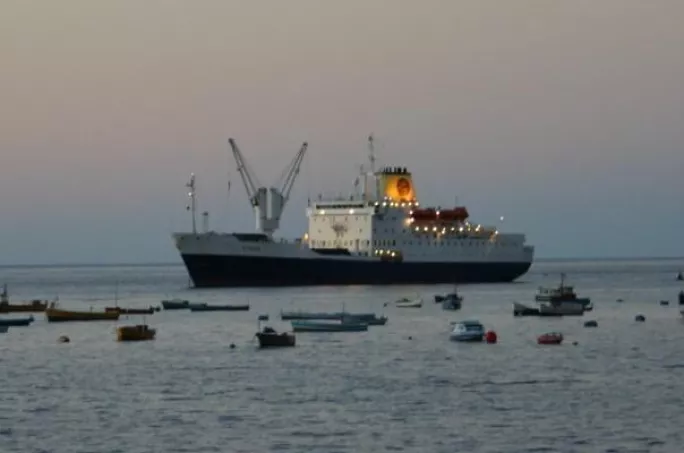The ‘autism lady’: Diary of an educational journey to St Helena (Part 2)
London headteacher Jude Ragan is spending 21 days working to assist autism teaching on the island of St Helena in the South Atlantic Ocean. She will be blogging about her experiences on the TES Professional blog. Here is Part 2.
The RMS St Helena takes three days to sail from Ascension to St Helena, and that boat journey joins with the overnight stop on Ascension (Part 1 of the blog) as another extraordinary leg of my journey to support autism practice in the southern hemisphere.
The crew come largely from the two islands and so are able to refer to themselves as “Saints”, the name the inhabitants give themselves. They were happily confident in their abilities on a sometimes-rolling sea, sailing a ship that is relatively small.
A third of the space on board was occupied by precious cargo to be delivered to the two islands. The third point in this three-legged journey and the source of the cargo is Cape Town, South Africa. As for passengers, there were 43 on board for this trip. The maximum capacity is 130, so I was well looked after and could enjoy the sun and the glorious dark blue sea undisturbed.
Breakfast and lunch on the ship were informal affairs, dinner more formal: there was a seating plan. On my table there was a couple going to visit their son and his family, the ship’s purser, himself of course a Saint, and an elder statesman of the island. The elder statesman is a speaker of the House here, a teacher, leader of the orchestra and now an advocate for members of the community in court cases. Older than me, he is the best possible advert for not retiring, but finding something useful to do in and for the community for as long as possible.
We finally moored off St. Helena at 6am and all went on deck to watch the approaching island. As dawn rose behind it, the island looked dark and somber and somewhat formidable and forbidding, and I wondered whether when Napoleon saw the same view in 1815 he thought that he really now was in the soup.
We were moored there for sometime before disembarkation and as the sun rose I could see more and more of the detail of the island: the pastel coloured houses in the long valley (known as a ‘gut’ here) that accommodates Jamestown, the capital, the bright red of the soil, the abundant greenery both around the town and on the hills beyond.
The journey to the dock in a tender was quick and in no time I stepped ashore, wobbling still from the voyage, and it seemed as if much of the town was there on the quayside to welcome someone from the RMS, I soon noticed my new boss, the director of education, whose face I knew from Skype. He whisked me to the end of the quay for a coffee under lime-green foliage facing the breaking waves: a delightful way to while away the time and to talk face-to-face for the first time while luggage and customs are being attended to.
Everything here is different from life in London; the climate, the pace, the culture. When talking to each other, Saints often slip into an impenetrable patois, but they also, of course, speak perfect English. The acceptance of incomers, the time to spend with each other - everyone here waves, stops and chats, has time for each other. It’s incredibly pleasant.
The house I am staying in is a long low bungalow overlooking the distant bay, and the roads up to it are vertiginous - the driveway to the house is a track of about 1:2 gradient, most roads are so steep and windy that cars rarely get out of second gear.
Everything is different, but I know that autism, when I meet with it tomorrow at the school, will still be the same.
Jude’s next blog will describe her first week working with autistic students on St Helena.
Keep reading for just £1 per month
You've reached your limit of free articles this month. Subscribe for £1 per month for three months and get:
- Unlimited access to all Tes magazine content
- Exclusive subscriber-only stories
- Award-winning email newsletters
